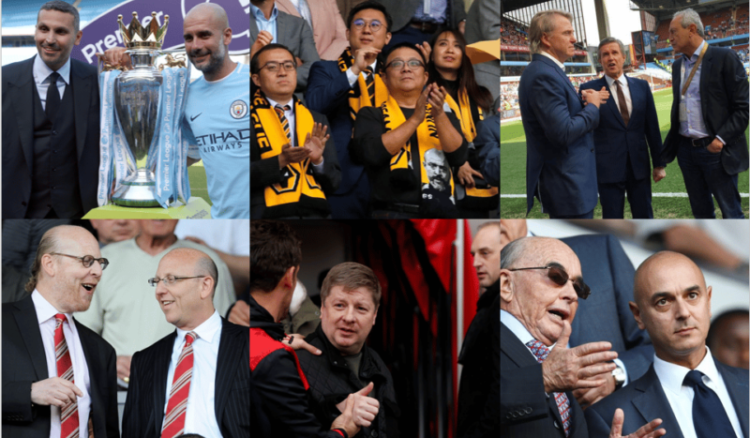
Welcome to the the Premier League 2022-23! Ever wondered who’s pulling the strings behind your favourite clubs? Who’s signing the cheques for those jaw-dropping transfers? Well, you’re in the right place! Our “Premier League 2022-23 Ownership by Club” page is your one-stop-shop for all the juicy details about the big bosses of the beautiful game. From the oil-rich magnates of Manchester City to the American tycoons at Liverpool, we’ve got the lowdown on who owns what in the most exciting league in the world. So, whether you’re a die-hard fan, a curious onlooker, or a fantasy football manager looking for some insider info, get ready to dive deep into the fascinating world of football ownership. It’s time to discover the power players off the pitch who make the magic happen on it! Buckle up, folks, because it’s going to be a thrilling ride!

As we delve into the 2022-23 Premier League season, it’s not just the players and managers who are in the spotlight. The club owners, often the unsung heroes (or villains, depending on your perspective), play a pivotal role in the success and direction of their respective teams. Let’s take a closer look at the individuals and consortiums that hold the reins of power in the Premier League.
| Club | Owners | Nationality | ||
|---|---|---|---|---|
| AFC BOURNEMOUTH | Maxim Demin | Russia |
| |
| ARSENAL | Kroenke Sports & Entertainment | United States |
| |
| ASTON VILLA | Nassef Sawiris & Wes Edens | United States |
| |
| BRENTFORD | Matthew Benham | England |
| |
| BRIGHTON & HOVE ALBION | Tony Bloom | England |
| |
| CHELSEA | Todd Boehly | United States |
| |
| CRYSTAL PALACE | Steve Parish / Joshua Harris & David S. Blitzer | United States / England |
| |
| EVERTON | Farhad Moshiri | British-Iranian |
| |
| FULHAM | Shahid Khan | United States / Pakistan |
| |
| LEEDS UNITED | Andrea Radrizzani (Aser) / San Francisco 49ers | Italy / United States |
| |
| LEICESTER CITY | Aiyawatt Srivaddhanaprabha | Thailand |
| |
| LIVERPOOL | Fenway Sports Group | United States |
| |
| MANCHESTER CITY | City Football Group / Khaldoon Al Mubarak | United Arab Emirates |
| |
| MANCHESTER UNITED | Joel and Avram Glazer | United States |
| |
| NEWCASTLE UNITED | Public Investment Fund | Saudi Arabia |
| |
| NOTTINGHAM FOREST | Evangelos Marinakis | Greece |
|
| SOUTHAMPTON | Sport Republic / Dragan Solak | Serbia |
| |
| TOTTENHAM HOTSPUR | ENIC International Limited / Joe Lewis | England |
| |
| WEST HAM UNITED | David Sullivan, David Gold & Daniel Křetínský | England / Czech Republic |
| |
| WOLVERHAMPTON WANDERERS | Fosun International / Jeff Shi | China |
| |
Ownership in football is more than just a financial investment. It’s about shaping the future of a club, making key decisions that can lead to glory or despair. The owners’ influence extends from the boardroom to the pitch, affecting everything from player transfers to managerial appointments, and even the club’s ethos and identity.
Historically, football clubs were owned by local businessmen with a passion for the game. However, the landscape has dramatically changed over the years. Today, the Premier League is a global spectacle, attracting owners from around the world. From American tycoons to Middle Eastern royalty, the range of owners reflects the international appeal of the league.
Ownership structures in the Premier League vary greatly. Some clubs are owned by a single individual or family, while others are controlled by multiple shareholders or investment groups. There are also clubs owned by their fans, although this is less common in the top flight. Each structure has its own advantages and challenges, influencing the club’s financial health, decision-making process, and long-term strategy.
Club ownership is not without its controversies. From leveraged buyouts leading to financial instability, to owners with questionable human rights records, the issue of who should be allowed to own a football club is a hot topic. Fans, pundits, and even politicians have voiced their concerns, leading to ongoing debates about the need for stricter ownership regulations in the game.
As the Premier League continues to grow in popularity and financial clout, the issue of club ownership will remain at the forefront. Will we see more foreign investment, or a return to local ownership? Could fan-owned clubs become the norm? Only time will tell. But one thing is certain: the owners, for better or worse, will continue to shape the destiny of their clubs and the Premier League as a whole.
So, as you cheer on your team this season, spare a thought for the individuals in the boardroom. Their decisions, ambitions, and visions will play a crucial role in the drama that unfolds on the pitch. After all, behind every great football club, there’s a team of owners calling the shots.